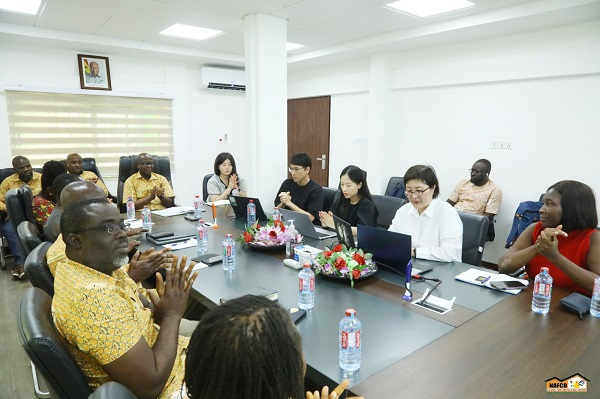 The visit aimed to brief the NAFCO boss on a new five-year agriculture intervention project
The visit aimed to brief the NAFCO boss on a new five-year agriculture intervention project
A joint team from the National Development Planning Commission (NDPC) and the Korean International Cooperation Agency (KOICA) has held discussions with the Chief Executive Officer of the National Food Buffer Stock Company (NAFCO) in Accra.
The visit aimed to brief the NAFCO boss on a new five-year agriculture intervention project dubbed “Strengthening of Agribusiness Value Chain for Local Economic Development in Ghana.”
The project, which begins this year in the Central and Volta Regions, seeks to increase the average income of farmers and create jobs in the targeted areas by enhancing the agribusiness value chain.
Valued at US$ 9.5 million, the initiative is being financed by the Korean government with counterpart support from the Government of Ghana. It focuses on three widely consumed vegetables, tomatoes, onions, and peppers, with the goal of increasing self-sufficiency rates by 2029, when the project ends.
The Chief Executive Officer of NAFCO, George Abradu-Otoo, told the visiting team that the government is taking urgent steps to reduce and ultimately curb what he described as the worrying phenomenon of post-harvest losses experienced by farmers across the country.
Sharing some startling statistics, Abradu-Otoo revealed that in some cases, as much as 60% of harvested crops are lost, leading to significant financial setbacks for farmers.
Post-harvest losses in Ghana are a major challenge, estimated to cost the country approximately US$ 1.9 billion annually. These losses occur at various points along the value chain, from harvest to consumption, and are attributed to poor post-harvest handling, inadequate storage, and lack of infrastructure. Estimates suggest that losses can range from 20% to 50% of total production.
Abradu-Otoo cited various causes of increasing post-harvest losses, including on-farm inefficiencies such as improper threshing, winnowing, and drying of grains. Other contributing factors include poor harvesting timing, adverse climatic conditions, improper handling practices, and market access challenges.
He noted that the government is addressing these issues under the Feed Ghana Programme and commended the Korean government for its longstanding support to Ghana.
According to him, any substantial reduction in post-harvest losses would contribute to price stability and help reduce inflation as the government works to reset the broader economy.
An official from the NDPC, Richard Tweneboah Kodua, stated that the project seeks to complement the government’s flagship agricultural intervention, the Feed Ghana Programme, and to consolidate national development gains.
The Deputy Country Director of KOICA, Eunsoo Oh, added that the project will introduce new technologies, improved seed varieties, and expert knowledge to enhance local farming, harvesting, and processing of the targeted crops.
